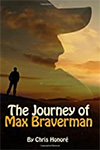Review — THE JOURNEY OF MAX BRAVERMAN by Chris Honore (Colombia)
 The Journey of Max Braverman
The Journey of Max Braverman
by Chris Honoré (Colombia 1967-69)
Independent Publishing
424 pages
January 2018
$16.oo (paperback
Reviewed by David Arnold (Ethiopia 1964-66)
•
If a novel can be a re-imagined life of an observant writer, which would be more difficult for one of us whose published work is reviewed in The Peace Corps Worldwide blog: the characters and events that we recall from a long-ago life in Colombia, or fiction we create from a more familiar American adolescence? The Journey of Max Braverman is the debut novel of freelance writer, journalist and former California high school English teacher Chris Honoré. In his case, Honoré–who served in Colombia in the late 60s and now lives in the small university town of Ashland, Oregon—chose to write about the innocence of teenagers coming of age that eventually encounters the social reality of America’s struggle with White supremacy.
The Journey of Max Braverman is really the story of two summertime journeys. One journey is Max’s journey in a small California town in the 60s or 70s, a summer’s life that serves as the start and the finish of the book. The other journey is that of an elderly sage, Amos, who runs the town’s local junkyard and offers Max a remarkably similar but unfinished tale of social awakening that occurred generations before in a small town in Georgia’s lowlands where teenaged love overcame greater odds.
The novel is constructed as three chapters, each with a leading character in Max’s summer: Jordie, Amos, and Tia. Chapter one is a clearly constructed and well-written narrative of Max’s life alongside his charming and beloved little brother, Jordie, and a good buddy by the name of Marty. Jordie is the illuminated star of the chapter narrated by big brother Max.
Their journey together is presented with all of the superlative expression of young boys who glory in their own daily adventures. It’s a life of 1960s nostalgia circumscribed by bicycles, baseball, comics books, and the caped heroes and lurking monsters of the movies that come to The Vista Theater. The chapter ends with a tragedy that for Max ends his California summer when, in the third chapter he meets the beautiful Tia. This first-time romance braves its way through the first days as the couple’s freshmen year among the Broncos of Watson High. There they are faced with more caste-like White supremacy. It’s a more subtle, contemporary discrimination than the Georgia variety but with a flexible yet resolute West Coast feel to it.
Honoré has inserted the Georgia summer of Amos, the local junkyard man in this California town, as a bridge between Max’s tragedy and his third-chapter romance with what I believe is the better-told story. Amos’ remembered story has a remarkable resemblance to Max’s own journey and offers Max a possible way forward in the final chapter. Of these two journeys into love within a White-Black world, I find the chapter told by Amos to me more vividly told. It has a certain rhythm and mystery to it, and it presents a clearer picture of the social divide of a Southern town, complete with physical drama and the geographic clarity of the Jim Crow-era conflict, a literal and a figurative crossing of a river that divides.
Throughout the book, Honoré chooses words well to picture both people and places. He also treats the reader with plenty of closely-watched detail, such as the way Jordie holds his glove to his hip as he ambles to center field, the ice-like sensation of Amos plunging deep into the pop cooler to pull out a chilly glass bottle of grape Nehi, and a description of a slow-moving river “so wide you couldn’t hit the other side with a hard-thrown rock.” The words of this author make both journeys well worth the reading.
•
David Arnold taught in a secondary school in Ethiopia from 1964 to 1966 and is retired from a career as a newspaper journalist and magazine editor.
No comments yet.
Add your comment